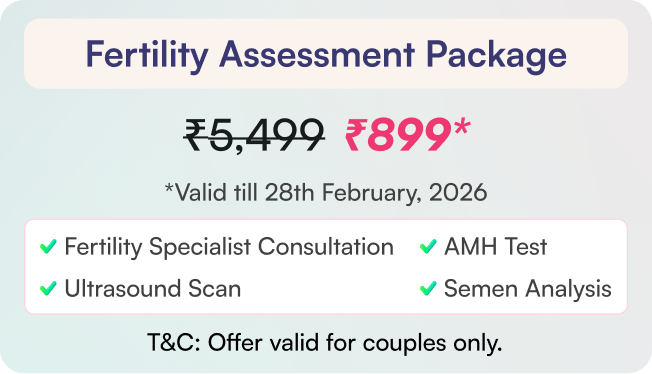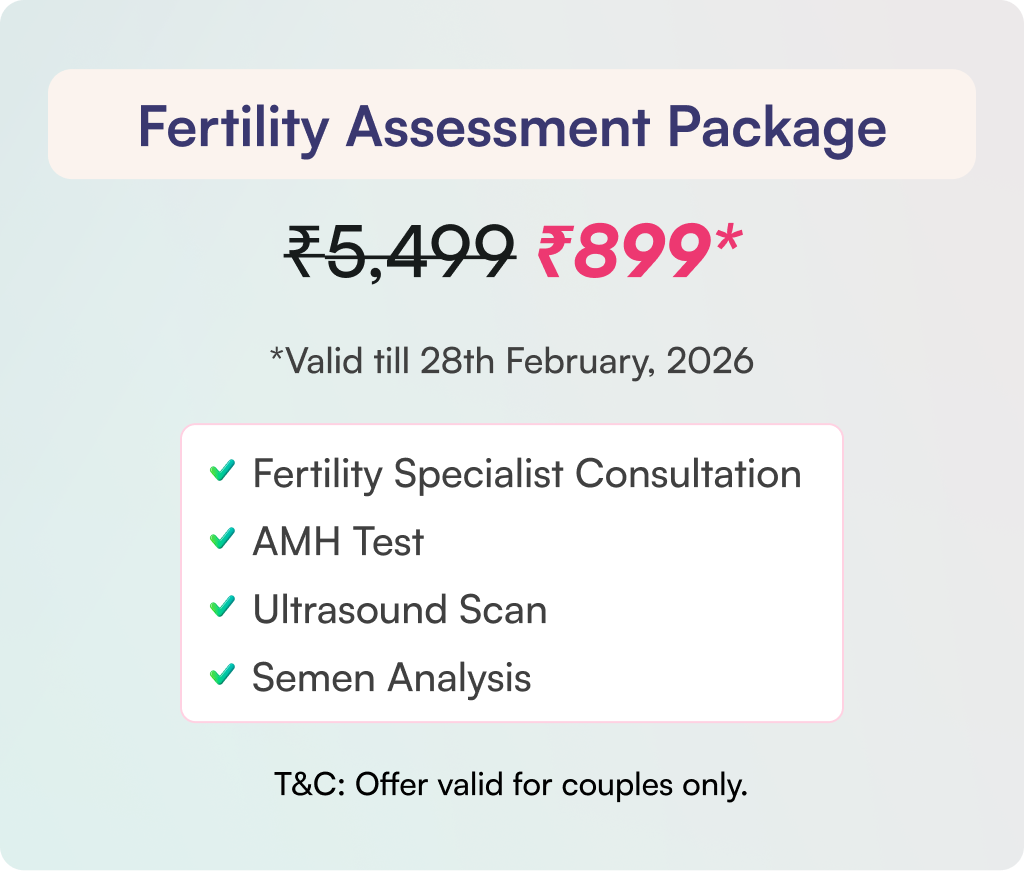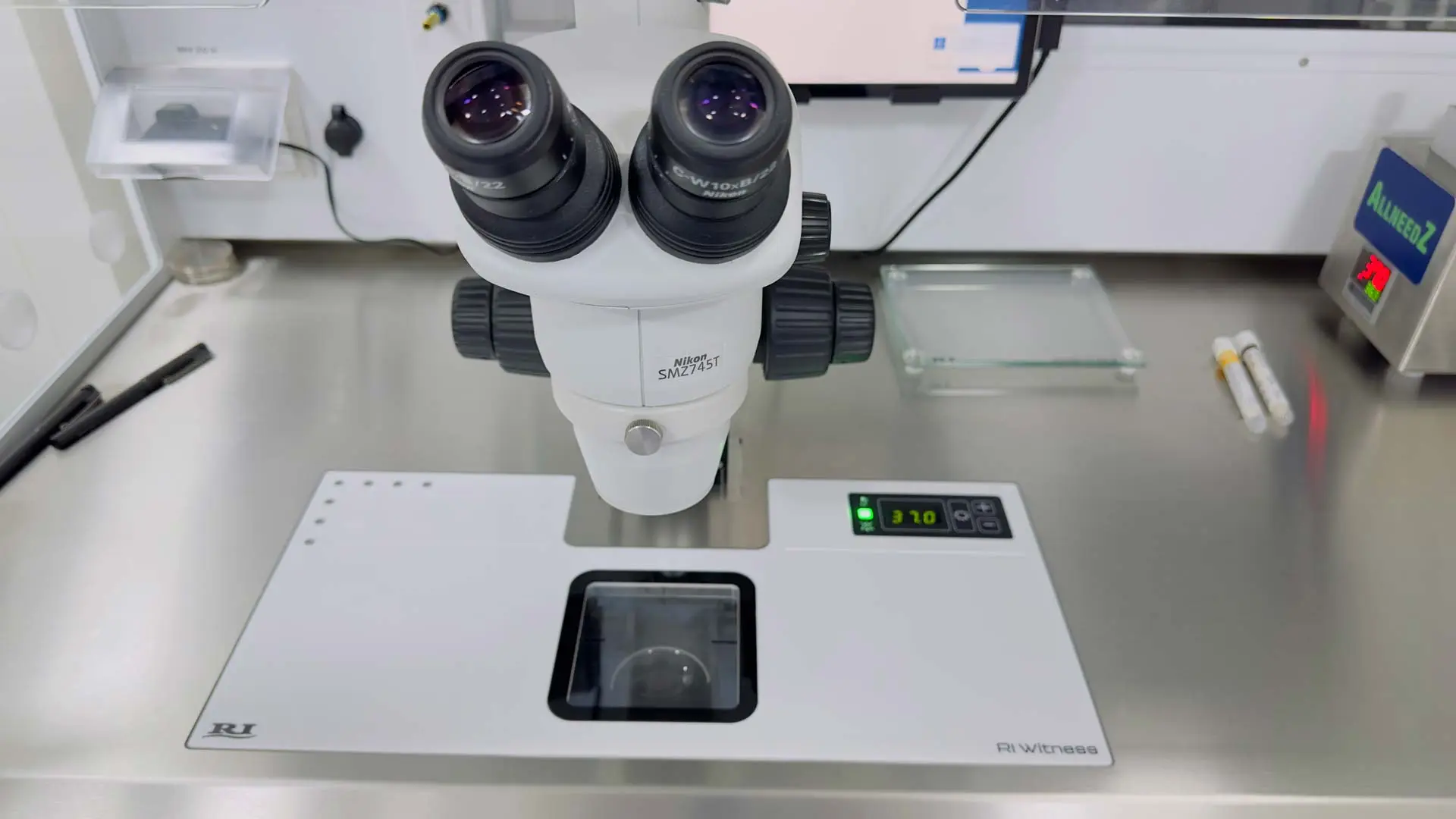What is IVF?
In Vitro Fertilization is a medical procedure where mature eggs are retrieved from the ovaries and fertilized by sperm in a specialized laboratory. The resulting fertilized egg, now an embryo, is then carefully transferred into the uterus. A full cycle of IVF typically spans about two to three weeks. Learn more about What is IVF?
Benefits of IVF Treatment
IVF offers numerous advantages, making it a viable option for various infertility issues:
- Higher Pregnancy Success: Compared to some other fertility treatments, IVF often has a higher chance of resulting in a pregnancy.
- Genetic Screening of the embryo before transfer: Preimplantation Genetic Testing (PGT) can be performed on embryos to screen for specific genetic defects or chromosomal abnormalities before transfer, reducing the risk of passing on certain conditions.
- Option to use Donor Eggs/Sperm: IVF allows for the use of donor eggs or sperm when necessary.
- Flexible Family Planning: Individuals facing medical treatments like chemotherapy, which can affect fertility, can opt to freeze their eggs, sperm, or embryos for future use through IVF, known as cryopreservation. This allows individuals or couples to plan parenthood according to their personal, professional, or financial circumstances, giving them the option to attempt pregnancy when they feel best prepared.
- Solutions for Various Fertility Problems: It can overcome issues like blocked or damaged fallopian tubes, male factor infertility (low sperm count or motility), ovulation disorders, endometriosis, uterine fibroids, and unexplained infertility.
Who Needs IVF Treatment?
You may need IVF if you are facing any of the following challenges:
- Blocked Fallopian Tubes: If both tubes are blocked or damaged, the egg cannot travel to the uterus to meet the sperm. IVF bypasses the tubes completely.
- Male Infertility Factors: If the male partner has a low sperm count, poor motility (movement), or issues with sperm shape. In severe cases, we use ICSI (Intracytoplasmic Sperm Injection) along with IVF to ensure fertilization.
- Severe Endometriosis: This condition causes tissue to grow outside the uterus, which can scar the ovaries and tubes, affecting fertility.
- Ovulation Disorders (PCOS): For women with Polycystic Ovary Syndrome (PCOS) who do not ovulate regularly and have not conceived with ovulation-inducing medicines.
- Advanced Maternal Age: Women over the age of 35 or 38 may have a lower “ovarian reserve” (fewer eggs left). IVF helps maximize the chance of pregnancy with the remaining eggs.
- Unexplained Infertility: Sometimes, all test results (sperm, tubes, ovulation) appear normal, yet pregnancy doesn’t happen. IVF can often overcome these hidden barriers.
- Genetic Concerns: If there is a risk of passing on genetic diseases (like Thalassemia), IVF allows us to screen embryos (PGT) before pregnancy.
Unsure if IVF is the right option for you? Speak with our fertility specialist for personalized guidance.
IVF Timeline – How Long Does It Take for the IVF Treatment?
One of the biggest worries for working couples is the time commitment. While everybody is different, a standard IVF cycle at Ferty9 typically follows a structured timeline of about 4 to 6 weeks.
Here is a simple IVF Timeline breakdown:
- The Planning Phase (Weeks 1-2) – Before we start, we need to prepare your body. This includes blood tests, scans, and sometimes taking birth control pills or other medications to regulate your cycle.
-
- Time Commitment: 1 or 2 clinic visits.
- The Stimulation Phase (Weeks 3-4) – This starts on Day 2 or 3 of your period. You will receive daily injections for approximately 10 to 12 days to stimulate egg growth.
-
- Time Commitment: You will visit the clinic 3-4 times for quick ultrasound scans (Follicular Monitoring) to check egg growth.
- The Procedure Phase (Week 4)
-
- Egg Retrieval: Once eggs are ready, we collect them in a minor 20-minute procedure.
- Embryo Growth: The eggs are fertilized and grown in our lab for 3 to 5 days.
- The Transfer Phase (Week 5 or Later)
-
- Fresh Transfer: The embryo is placed into your uterus 3 to 5 days after egg collection.
- Frozen Transfer (Recommended): Often, we freeze the embryos and transfer them in the next menstrual cycle. This gives your body time to recover from the medicines, which often leads to higher success rates.
Total Time:
- Fresh Cycle: Approx. 3 to 4 weeks (from Day 1 of period to Transfer).
- Frozen Cycle: Approx. 6 to 8 weeks (split over Two Menstrual Cycles).
Note: You do not need to take a long leave from work. Most appointments are short, and you only need to rest on the day of Egg Retrieval and the day of Embryo Transfer.
How Do You Prepare for IVF Treatment?
Preparation for IVF is crucial and typically begins 2 to 4 weeks before starting the actual cycle. This phase may involve:
- Initial Consultation and Testing: Thorough medical history, fertility testing, and evaluations for both partners (ovarian reserve testing, semen analysis, infectious disease screening).
- Lifestyle Adjustments:
- Healthy Diet: Focus on a balanced diet rich in fruits, vegetables, lean protein, and whole grains.
- Maintain a Healthy Weight: Being significantly overweight or underweight can affect IVF outcomes.
- Avoid Smoking, Alcohol, and Recreational Drugs: These can negatively impact egg and sperm quality and overall success.
- Limit Caffeine: Discuss caffeine intake with your doctor.
- Stress Management: Incorporate stress-reducing activities like yoga, meditation, or light exercise.
- Medications: Your doctor might prescribe medications to regulate your menstrual cycle or address other underlying conditions.
- Supplements: Folic acid is typically recommended. Discuss any other supplements with your doctor.
What is the Process of In Vitro Fertilization (IVF)?
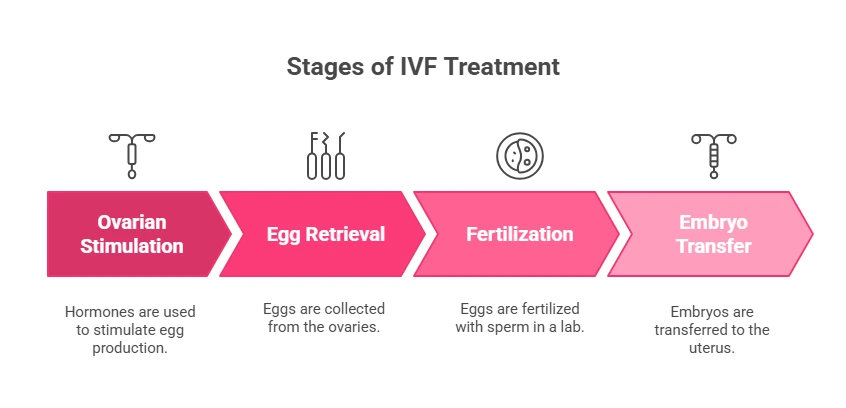
Stages of IVF treatment include:
- Ovarian Stimulation: Fertility medications (hormone injections) are administered for 8-14 days to stimulate the ovaries to produce multiple mature eggs, rather than the single egg that normally develops each month. Regular monitoring through blood tests and ultrasound scans is done to track follicle development.
- Egg Retrieval: Once the eggs are mature, they are retrieved in a minor surgical procedure performed under sedation or anesthesia. A thin needle, guided by ultrasound, is passed through the vaginal wall into the ovarian follicles to collect the eggs. On the same day as the egg retrieval, a semen sample is collected from the male partner or a sperm donor. The sperm are then processed in the lab to select the healthiest and most motile ones.
- Fertilization: The retrieved eggs and prepared sperm are combined in a laboratory dish for fertilization. In some cases, a technique called Intracytoplasmic Sperm Injection (ICSI) is used, where a single healthy sperm is injected directly into each mature egg. This is often used for male factor infertility. The fertilized eggs, now embryos, are cultured in the laboratory for 3 to 5 days. During this time, embryologists monitor their growth and development.
- Embryo Transfer: The healthiest embryo(s) are selected and transferred into the woman’s uterus. This is a simple procedure in which a thin catheter is passed through the cervix into the uterus to deposit the embryo(s).
Know more about step by step ivf process in detail.
As a general guideline to balance success rates with safety, not more than 2 embryos are typically transferred in one cycle. The final decision on the number of embryos to transfer is made carefully, considering the patient’s age, the quality of the embryos, and the history of any previous IVF attempts.
Transfers are frequently done at the blastocyst stage (day 5 of embryo development), as these more developed embryos often have a higher implantation potential. To minimize the health risks associated with multiple pregnancies (like twins or triplets), the goal is often a Single
Embryo Transfer (SET), where one high-quality blastocyst is transferred. Progesterone medication is often prescribed after embryo transfer to help prepare the uterine lining for implantation and support early pregnancy.
After the Procedure
Following the embryo transfer, there’s a “two-week wait” before a pregnancy test can reliably detect pregnancy.
- Rest and Activity: Light to moderate activity is generally fine. Vigorous exercise should usually be avoided. Your doctor will provide specific instructions.
- Medications: Continue any prescribed medications, such as progesterone.
- Symptoms: Some women experience mild cramping, bloating, or light spotting. These can be due to the procedure or early signs of pregnancy, but they can also occur if the cycle is unsuccessful. It is important to report any symptoms you experience to your doctor or fertility specialist for guidance.
- Pregnancy Test: A blood test (hCG test) is typically scheduled about 9-14 days after the embryo transfer to determine if pregnancy has occurred.
Positive Pregnancy Test
A positive pregnancy test after IVF is a joyous moment.
- Confirmation: Your clinic will likely confirm the pregnancy with blood tests to measure hCG levels and then schedule an ultrasound scan around 6-8 weeks to check for a fetal heartbeat and confirm the viability and location of the pregnancy.
- Continued Care: You will typically remain under the care of the fertility clinic for the first 8-10 weeks of pregnancy before transitioning to a regular obstetrician.
- Medication: You may need to continue medications like progesterone for several more weeks to support the pregnancy.
Negative Pregnancy Test
Receiving a negative pregnancy test after an IVF cycle can be incredibly disappointing and emotionally challenging.
- Support: Allow yourself time to grieve. Seek support from your partner, family, friends, or a counsellor.
- Consultation with Doctor: Schedule a follow-up appointment with your fertility specialist. They will review the cycle, discuss potential reasons why it may not have been successful, and explore options for the future.
- Second Opinion: Consider consulting another specialist before starting a new cycle. A fresh perspective can provide alternative insights into your diagnosis or suggest different treatment protocols and technologies.
- Further Testing: Additional tests might be recommended.
- Future Cycles: You might consider another IVF cycle. Sometimes adjustments to the protocol can improve chances in subsequent attempts.
- Other Options: Depending on your situation, other options like using donor eggs/sperm, surrogacy, or considering adoption might be discussed.
- Delayed Period: Sometimes, even with a negative test, your period might be delayed due to the hormonal medications used during IVF. It’s important to discuss this with your doctor.
IVF Success Rate
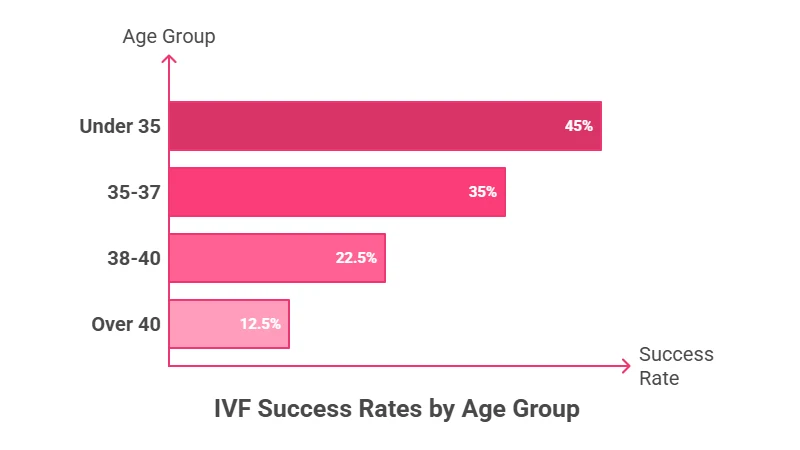
- Average IVF Success Rate: Globally, for women under 35, the average live birth rate per IVF cycle can be around 35-40%, decreasing with increasing age.
- Women under 35: ~40-50%
- Women aged 35-37: ~30-40%
- Women aged 38-40: ~20-25%
- Women over 40: ~10-15% or lower.
IVF Success Rate in India & Ferty9
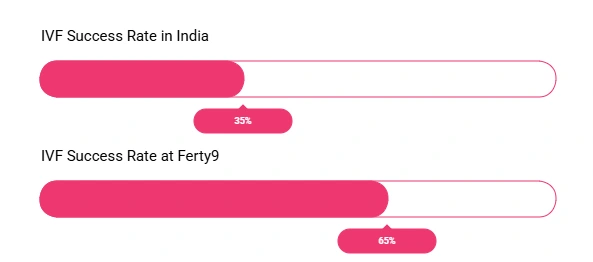
The average IVF success rate in India is generally reported to be between 30% to 40%. Ferty9 reports a consistent overall success rate of 60% to 70%.
Ferty9 recognizes that factors such as declining ovarian reserve, embryo quality, uterine health, the number of IVF cycles, individual fertility issues, and lifestyle choices all influence success rates. At our clinics, the overall success rate is 60-65% for Indian women between 24 and 35 years, which represents a strong outcome and likely refers to pregnancy rates per cycle or combined rates over multiple cycles for this ideal age group. We recommend consulting directly with the clinic for individualized success rate discussions based on your specific circumstances
IVF Second Opinion: When to Consult a New Fertility Specialist
Fertility treatment is a significant emotional and financial investment. If you feel stuck in your journey or unsure about your current treatment plan, getting a fresh perspective is not just okay, it is a smart decision. You should consider booking a consultation at Ferty9 for a second opinion if:
- You Have Experienced Repeated IVF Failures: If you have had 2 or more failed IVF cycles without a clear explanation, our advanced lab technology and senior doctors can help analyse “why” it happened.
- You Have Had Multiple Miscarriages: Recurrent pregnancy loss requires deep investigation into genetic or immunological factors.
- You Were Told “Donor Eggs” is Your Only Option: Many women with low AMH (low egg count) are told to give up on their own eggs too early. We specialize in protocols that try to use your own eggs first.
- You Feel Your Treatment Plan isn’t Personalized: If you feel like you are on a “conveyor belt” and your doctor isn’t adjusting the treatment to your specific body type, it is time for a change.
- You Have Questions About Advanced Options: If your current clinic does not offer advanced solutions like Laser Assisted Hatching, Blastocyst Culture,
or ERA (Endometrial Receptivity Analysis), a second opinion can open new doors for success.
At Ferty9, we review your entire medical history with fresh eyes to find the missing piece of the puzzle.
IVF Risks
While IVF is generally safe, like any medical procedure, it carries some risks:
- Ovarian Hyperstimulation Syndrome (OHSS): A rare but potentially serious complication where the ovaries become swollen and painful due to fertility drugs. Symptoms can range from mild (bloating, nausea) to severe (rapid weight gain, shortness of breath, blood clots). Careful monitoring helps prevent severe OHSS.
- Multiple Pregnancies: Transferring more than one embryo increases the chance of twins, triplets, or higher-order multiples. Multiple pregnancies carry higher risks for both mother and babies (e.g., premature delivery, low birth weight).
- Egg Retrieval Complications: Risks include bleeding, infection, or damage to the bowel or bladder, though these are rare.
- Ectopic Pregnancy: A small risk that the embryo implants outside the uterus, usually in a fallopian tube. This is a non-viable pregnancy and requires medical treatment.
- Miscarriage: The rate of miscarriage after IVF is similar to that of natural conception, increasing with maternal age.
- Emotional and Psychological Stress: The IVF process can be emotionally and physically demanding.
- Birth Defects: The risk of birth defects in IVF babies is generally considered to be low and comparable to that in naturally conceived babies.
IVF Cost
IVF Cost in India
| Cost Component | General Average in India (Per Cycle) | Ferty9 Fertility Center (Per Cycle) |
| Initial Consultation & Scans | ₹2,000 – ₹5,000 | Included in Package |
| Ovarian Stimulation Meds | ₹60,000 – ₹1,50,000 | Optimized based on Reserve |
| Egg Retrieval & OT Charges | ₹30,000 – ₹50,000 | Included in Base Cost |
| IVF/ICSI Lab Charges | ₹50,000 – ₹80,000 | High-End Lab Included |
| Embryo Transfer Procedure | ₹20,000 – ₹40,000 | Included in Package |
| Total Estimated Range | ₹1,50,000 – ₹3,50,000+ | ₹1,50,000 – ₹2,00,000* |
* Note: Final costs may vary based on advanced requirements like PGT, Donor Eggs, or Embryo Freezing.
IVF Cost at Ferty9
Why Choose Ferty9 for IVF Treatment
Here’s why thousands of families across India have trusted us with their journey:
- A Legacy of High Success Rates: Your primary concern is success, and that is our main focus. Ferty9 is proud to maintain a consistent IVF success rate of 60% to 70%, among the highest in the country. This isn’t just a statistic; it represents over 13,500+ happy babies and families we have helped create.
- Expertise You Can Trust: Our team of renowned fertility specialists and skilled embryologists brings decades of combined experience in IVF and other assisted reproductive technologies. We don’t just offer treatments; we offer the wisdom and skill of doctors who are leaders in their field and understand the specific fertility needs of Indian couples.
- State-of-the-Art IVF Labs: An IVF cycle’s success is highly dependent on the lab environment where your embryos grow. Our centres are equipped with advanced, international-standard IVF labs. We use sophisticated incubators that mimic the conditions of a mother’s womb, giving your embryos the best possible start in life and maximizing your chances of a successful pregnancy.
- You Are at the Centre of Our Care: At Ferty9, you are not just a case file. We understand the emotional and physical challenges of fertility treatment. We provide truly personalized care, designing a treatment plan that is tailored specifically for you. Our team offers constant emotional support and clear communication, ensuring you feel comfortable, informed, and cared for at every step.
- Transparent and Ethical Approach: We believe in building trust through transparency. From your first consultation, we provide clear information about the process and costs, with no hidden charges. All our treatments and procedures strictly follow the guidelines set by the Indian Council of Medical Research (ICMR), ensuring you receive the most ethical and highest standard of care.
Choosing Ferty9 means choosing a team that is as invested in your dream as you are. Let us be your trusted partner on this beautiful journey to parenthood.
✅
Medically Reviewed & Verified By

Dr. Jyothi C Budi
Medical Director, Reproductive Medicine and Gynecology
Experience: 20+ Years | View Doctor Profile →
This page has been medically reviewed to ensure accuracy, clinical relevance, and alignment with current fertility treatment standards.
IVF Treatment Centers Near You
IVF Treatment Cost in Our Locations
IVF Specialists at Our Locations
Videos on IVF Treatment
This page was last updated on :
2 Feb 2026Have More Queries About IVF And Its Treatments? Ask Our Experts
Contact UsAn IVF pregnancy is generally considered safer after a fetal heartbeat is confirmed via ultrasound, typically around 6–7 weeks. After the first trimester (around 12 weeks), IVF pregnancies are managed similarly to natural pregnancies, though your doctor may recommend additional monitoring.
The overall risk of birth defects in IVF babies is low and comparable to naturally conceived babies. Some studies suggest a slight increase in specific conditions, possibly linked to the cause of infertility rather than IVF itself. Preimplantation Genetic Testing (PGT) can help screen embryos.
– Physically: You will likely get your period, which may be heavier than usual. Hormonal levels will gradually return to normal.
– Emotionally: A failed IVF cycle can be emotionally tough. Feelings of sadness, anger, or grief are common. Emotional support or counselling is recommended.
The number of IVF cycles needed varies per person. Some achieve pregnancy in the first cycle, while others may require multiple cycles. Your doctor will evaluate your response and outcomes from the first cycle to plan further treatment.
IVF success rates vary based on age, cause of infertility, embryo quality, and clinic expertise. Women under 35 generally have a 60–70% success rate per cycle. Success rates decline with age. Your fertility specialist can provide individual success estimates.
– Injections: May cause mild stinging or bruising at the site.
– Egg Retrieval: Done under sedation or light anesthesia, typically pain-free. Some cramping may occur afterward.
– Embryo Transfer: A quick and usually painless procedure, similar to a Pap smear. Some women may feel mild cramping.
The number of injections depends on your treatment plan. Typically, 1 to 2 injections per day are required for about 8–12 days during the ovarian stimulation phase. Progesterone support may continue for several weeks through injections or alternative methods like pessaries or gels.
Common medications used in IVF include:
– Ovarian Stimulation Drugs: Help the ovaries produce multiple eggs (e.g., FSH, hMG).
– Ovulation Prevention Drugs: Prevent premature ovulation (e.g., GnRH agonists or antagonists).
– Trigger Shot: Stimulates final egg maturation before retrieval (e.g., hCG).
– Progesterone: Prepares the uterine lining for embryo implantation and supports early pregnancy.
IUI (Intrauterine Insemination): Specially prepared sperm are placed directly into the uterus around the time of ovulation. Fertilization happens inside the body.
IVF (In Vitro Fertilization): Eggs are retrieved from the ovaries and fertilized by sperm outside the body, in a lab. The resulting embryo is then transferred into the uterus.
